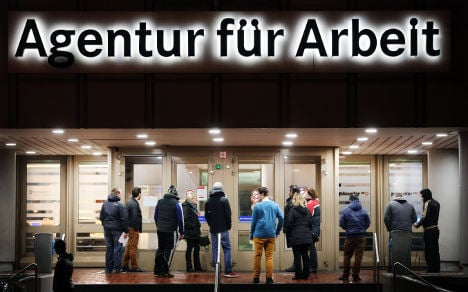On the face of it, headline unemployment fell this month, but the drop was solely due to seasonal factors, monthly data compiled by the Federal Labour Office showed.
The raw or unadjusted jobless total fell by 83,360 to 2.937 million and the jobless rate – which measures the number of unemployed as a proportion of the working population as a whole – fell to 6.8 percent in May from 7.1 percent in April.
In seasonally-adjusted terms, however, the jobless total – which irons out seasonal fluctuations – increased by 21,000 to 2.963 million the agency said, faster than analysts’ expectations. And the seasonally-adjusted jobless rate was unchanged at 6.9 percent.
Labour office chief Frank-Jürgen Weise insisted that the job market was “fundamentally sound and is developing solidly in a difficult economic environment”.
But he noted that the usual spring upturn was weaker than usual this year.
Analysts blamed that on the large number of public holidays in May, as well as the unseasonably cold and wet weather – which usually affects employment in outdoor sectors such as construction.
“The non-seasonally adjusted drop was the weakest May performance since 2005,” said ING DiBa economist Carsten Brzeski.
“To some, this is a clear warning that the debt crisis is finally taking its toll on the German labour market. In our view, however, the weak spring revival can also be explained by the relatively high number of public holidays in May and the still cold weather,” he said.
“It is far too premature to start singing swan songs on the labour market,” Brzeski said.
Berenberg Bank economist Christian Schulz agreed.
The rise in seasonally-adjusted data “is likely to remain a minor temporary setback,” he said.
“The strong increase in sentiment indicators such as the Ifo index points to resuming growth. The underlying fundamentals are very favourable,” the expert argued.
He believed employers were keeping cautious after the concerns about Italy and Cyprus and the long and harsh winter.
With private consumption growing and healthy wage increases boosting purchasing power, stronger domestic demand should “offset the temporarily clouded export outlook and allow Germany’s economy to return to trend growth rates over the course of 2013,” Schulz said.
Natixis economist Paul Beaumont said he was also confident that the German labour market would remain “resilient to the depressed economic conditions”.
“All in all, we expect the German unemployment rate to remain close to a post-reunification low at 6.9 percent in 2013,” he said.
Newedge Strategy analyst Annalisa Piazza was more cautious.
She predicted that, despite rising business confidence, “we still expect the labour market to show signs of slow moderation as the German economy is still running below potential and companies are unlikely to revise their hiring plans near term.”
AFP/mry




 Please whitelist us to continue reading.
Please whitelist us to continue reading.
Member comments